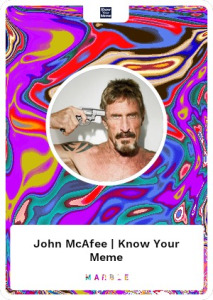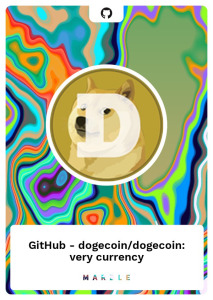Cryptocollectibles so far have spanned kitties, punks, Pepes, and sentient crystals. Now, a pair of developers in Sweden want people to “collect the internet.”
It sounds ridiculous, and that’s maybe because it is. But Johan Unger and Mattias Tyrberg are serious when they talk about MarbleCards, their cryptocollectible project that is currently in beta and lets users create their own digital cards—like virtual baseball cards, but instead of featuring pro athletes, they’ll (eventually) be able to showcase any webpage on the internet. People aren’t using real money to bid on cards yet, but the eventual plan is to let people use ether to buy the cards, each of which will be unique thanks to nonfungible ERC-721 tokens.
Who will those users be? Unger and Tyrberg’s marketing efforts are confined largely to social platforms like Twitter, Discord, Medium, and especially Reddit. You know, places on the internet where people discuss other places on the internet. Places that could always use an even more meta take on internet culture.
Right now, MarbleCards is focusing on memes, which Unger and Tyrberg believe will be the most accessible way into the cards—in other words, the lowest bar of popular digital content. So far, of the more than 3,000 cards beta users have created, at least five depict the 2004 internet sensation Salad Fingers, several just feature different crypto logos like Augur and Tron, and one shows a picture of a hamburger from Wikipedia.
The idea is for the price of each card to signify its level of demand, and therefore tell us something about the perceived value of each meme, each web page, and whatever YouTube video or even journalistic article users decide to put on MarbleCards (if people do indeed end up bidding on them). Any given URL can only be “marbled” once, so each card will technically be one-of-a-kind (though two different websites can always house the same content). By “collect[ing] your favorite internet moments,” as the beta site says, users may reveal a hierarchy of perceived online content value.
 Perhaps this reflects the way Unger and Tyrberg view the internet, a virtual place where a New York Times article could have the same or less value than a John McAfee tweet (a card already created by Unger). Both Unger and Tyrberg come from digital publishing. After graduating from high school, Unger built a digital news aggregator called Qulart in 2009, which fell out of use after the debut of Flipboard, and he later cofounded Strossle, a “content recommendation company” he compares to Taboola (think the “stories you may like” at the end of news articles, offering to show readers what the kid on “Two and a Half Men“ looks like now). Strossle bought Tyberg’s text analytics company three years ago, after which the pair started working to incorporate cryptocurrency into Strossle’s product.
Perhaps this reflects the way Unger and Tyrberg view the internet, a virtual place where a New York Times article could have the same or less value than a John McAfee tweet (a card already created by Unger). Both Unger and Tyrberg come from digital publishing. After graduating from high school, Unger built a digital news aggregator called Qulart in 2009, which fell out of use after the debut of Flipboard, and he later cofounded Strossle, a “content recommendation company” he compares to Taboola (think the “stories you may like” at the end of news articles, offering to show readers what the kid on “Two and a Half Men“ looks like now). Strossle bought Tyberg’s text analytics company three years ago, after which the pair started working to incorporate cryptocurrency into Strossle’s product.
Instead of integrating, however, they came up with MarbleCards and spun it off from the company. Eventually, they’re hoping MarbleCards can help publishers get traffic. In addition to being unique collectibles, they’ll also link back to whatever users decide to “marble,” a verb the pair use comfortably. Needless to say, this is not yet the “killer dapp” the media industry’s been awaiting, but it’s certainly a novel approach to web traffic.
MarbleCards plans to launch next Friday, January 18. In the meantime, BREAKER caught up with Unger and Tyberg over video chat to briefly discuss the most valuable Twitter content, how their product could help publishers, and why they made this thing.
What would you say is the main point of MarbleCards?
Unger: There are a lot of points. But I would say initially, it’s a way to express yourself and create collectibles that you care about. Collecting things is a very strong human behavior, and it’s been that way for forever. What we see with Marble is that it’s a platform to facilitate that collection, or the collectability, of anything.
So anyone can create their own card of pretty much whatever they like online, but there’s definitely an emphasis on memes on your website and in your Discord channel. Can you explain that?
Unger: The first site that users will be able to marble is Know Your Meme. We know memes are such a strong thing in the internet community. It’s also a good way to ease into the whole concept of Marble, and to limit the scope and make things seem scarcer in the beginning…but we will add new sites every week from the day we launch.
 What do you think we can gain from a meme value hierarchy?
What do you think we can gain from a meme value hierarchy?
Unger: One, it’s just a good way to analyze topics and what’s valuable to people, what people care about. We come from the publisher space, and we know how important content data and engagement data are. So we think that in that aspect, it’s super valuable. How does the value of a card or a meme change over time? Do you think Elon Musk will be valued higher in two years than now? Then you can invest in an Elon Musk card.
What do you think will be the most valuable meme or web page?
Unger: I pick Bitcoin.org. That’s to me, like the closest to my heart.
Tyber: And I choose Elon Musk on Twitter.
Is that because you think the more he tweets, the more that MarbleCard will gain value?
Tyberg: It more reflects my personality. It’s not about the value itself. Elon is one of the few people I look up to. Of course, he’s done certain things that you maybe don’t look up to, but…the essence we see in MarbleCards is that you can marble something that you care about, and you can save it.
It seems like you answered which ones you like the most. I’m wondering which ones you think will be the most generally valuable.
Unger: That’s a very difficult question.
Tyberg: I think it depends on who’s playing. I need to think about that.
Unger: Maybe the more long-lasting things, like songs that are considered the best songs, maybe movies, maybe books. So very strong popular culture—things that have been around for 100 years and will be around for another 100.
Tyberg: I might have a better answer now—deleted tweets. Before someone deletes a tweet, if you marble it, it will stay on the blockchain. It would be a “proof of this existed.” It’s like the opposite of a Snap. I think these kinds of moments could be extremely valuable. I don’t know what kind of tweets that Trump or Elon or someone else would do that’s crazy enough, but if they do the wrong thing that they then delete, that probably has a high meme value.
Are MarbleCards more like collectibles, like baseball cards? Are they art? Or are they useful…?
Unger: The goal is to have them be all three. One, there’s something collectible that you care about and are passionate about. But it should also be beautiful to look at. So we think that cards that have a beautiful pattern will drive value to the card. But then again, we’re also building applications on top. And hopefully people can use their cards to both get a fun experience out of it, but also financial return if they’re good at playing the games.
There’s also a generative art aspect in the marble-looking swirl on each card, right?
Tyrberg: Yes. That’s based on the quality of the link. If the link has a lot of traction on social media or has a high page rank, the artwork will look more intense and hopefully look better than [a card with] a URL that does not get a lot of attention… We also transfer the rights to this artwork to the person buying the token. So you own the card, and you own the graphics, as well. It’s not only owning a token. You’re also owning some piece of our artwork.